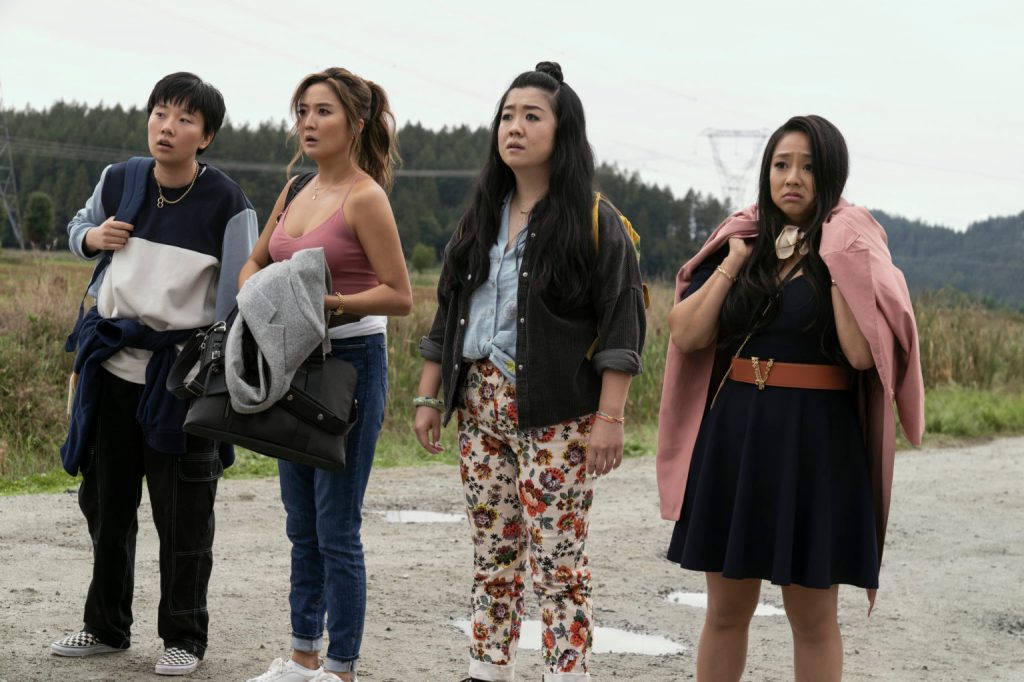
A year ago we had an Irish film of a similar name with Olivia Colman. This couldn’t be much different. Directorial debut by Adele Lim who scripted Crazy Rich Asians this has much the same mood and involves a road trip to China and Korea by 4 female friends. Audrey (Ashley Park) is a hotshot lawyer who was adopted by white parents from China as a child. Now, she is returning for the first time for business. Lolo (Sherry Cola) is her childhood friend accompanying her. They will meet up with Kat (Stephanie Hsu) who is a star actress now in China and the fourth and incongruous member of the group is Deadeye (Sabrina Wu). In the rather far-fetched script Audrey has to prove her Chinese heritage to win a contract so she sets off to find her birth mother.
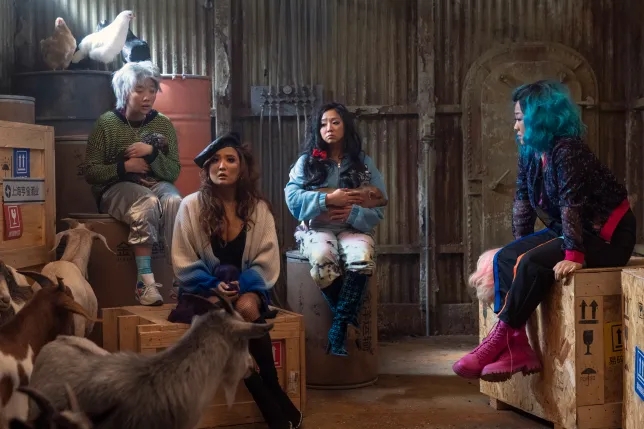
On a train they end up nearly getting busted for drugs, get rescued in the wilderness by a basketball team they then proceed to bed, Audrey gets fired, they pretend to be a K-Pop band and finally Audrey finds family of sorts in Korea. A final scene back in the USA shows how they move on from all this a year later.
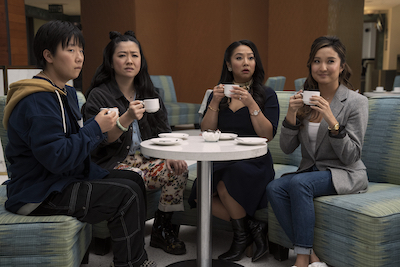
What works here? It’s a pacy movie full of jokes, which are not all funny but do raise a laugh on many occasions. The actresses are natural comedians and it is a joy to watch the way they act. Parks surprised me with her versatility and Cola was a star in Shortcomings. Their energy is also vital to help us believe all the implausible plot twists such as becoming a K-Pop band called Brown Tuesday.

You may not be so keen on the scatological references, the pussy numbers (Cardi B and other musical influences are found here) and some of the Asian jokes seem more like a clichéd stand-up comedy routine than anything else. And of course it is good to see a comedy propelled by Asian women showing it can stand up against the best.
3 stars plus







































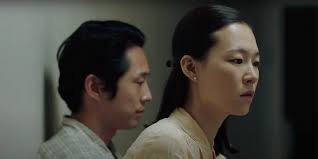













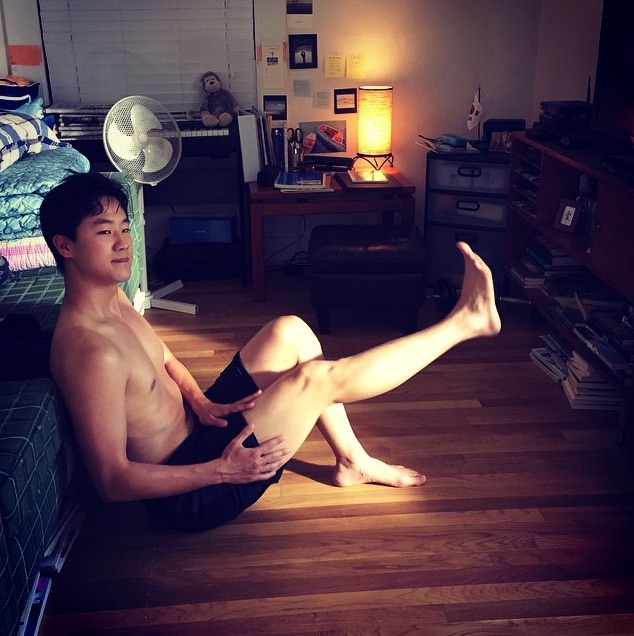

 but after building up a lovely bit of tension over the first two thirds unravels in rather a ridiculous way in the final part. The subject matter is also a Korean favourite, the excesses of the monied classes and their often despicable behaviour to maintain their wealth and status.
but after building up a lovely bit of tension over the first two thirds unravels in rather a ridiculous way in the final part. The subject matter is also a Korean favourite, the excesses of the monied classes and their often despicable behaviour to maintain their wealth and status.
 starting to lose his marbles and bedding the Filipino maid which causes a big fight with his wife, the matriarch (Yuh-Jung Youn, enjoying her Lady Macbeth role).
starting to lose his marbles and bedding the Filipino maid which causes a big fight with his wife, the matriarch (Yuh-Jung Youn, enjoying her Lady Macbeth role). She is in fact the heiress of the company and her father still whizzes in and out in a wheelchair pushed by a sinister housemaid. Dad is half crazy, half wise. There are 2 kids, Chul, who wants to put his stamp on the company but keeps getting into trouble with the law and sent to prison and Nami, a divorced daughter who lives at home and is rather unimpressed with the family behaviour.
She is in fact the heiress of the company and her father still whizzes in and out in a wheelchair pushed by a sinister housemaid. Dad is half crazy, half wise. There are 2 kids, Chul, who wants to put his stamp on the company but keeps getting into trouble with the law and sent to prison and Nami, a divorced daughter who lives at home and is rather unimpressed with the family behaviour. All of this is seen through the eyes of the driver/gofer Joo (Kang-woo Kim), a handsome if somewhat put upon servant.
All of this is seen through the eyes of the driver/gofer Joo (Kang-woo Kim), a handsome if somewhat put upon servant.  His duties include packing bribe money and bedding the old lady. As the father loses his grip, more and more duties fall on Joo and he is dragged into the family mire.
His duties include packing bribe money and bedding the old lady. As the father loses his grip, more and more duties fall on Joo and he is dragged into the family mire.
 Then, however, we have a murder, a suicide attempt, some mile-high sex, a ghost and a pointless fist fight supposedly to resolve everything and it loses a lot of credibility. Still, it is an enjoyable watch, just needed to be a lot tighter as a story.
Then, however, we have a murder, a suicide attempt, some mile-high sex, a ghost and a pointless fist fight supposedly to resolve everything and it loses a lot of credibility. Still, it is an enjoyable watch, just needed to be a lot tighter as a story.
 Bong Joon Ho achieves a seldom-seen amalgam of all of this, carefully and creatively constructed.
Bong Joon Ho achieves a seldom-seen amalgam of all of this, carefully and creatively constructed. ingratiates its way into the life of a rich family
ingratiates its way into the life of a rich family who live in an imposing architecturally designed house on the edge of town.
who live in an imposing architecturally designed house on the edge of town. Without divulging their family connection, they pose as the English tutor, art therapist, driver
Without divulging their family connection, they pose as the English tutor, art therapist, driver and housekeeper of the family, assuming these roles as the original people leave or are fired.
and housekeeper of the family, assuming these roles as the original people leave or are fired. The ingenuity with which they manage it is one thing. But it also highlights the gap between rich and poor. Mrs Park (the rich mother) is gullible
The ingenuity with which they manage it is one thing. But it also highlights the gap between rich and poor. Mrs Park (the rich mother) is gullible and naïve and yet has money to burn, Mrs Kim (the poor mother) is a smart cookie but can barely scrape two pennies together. Other class differences and unfairness springs to light in the course of the movie. All this is settled into place by mid-film when a plot development
and naïve and yet has money to burn, Mrs Kim (the poor mother) is a smart cookie but can barely scrape two pennies together. Other class differences and unfairness springs to light in the course of the movie. All this is settled into place by mid-film when a plot development takes everything to another level and eventually leads to a pretty dynamic denouement. Kang-ho Song as the poor father
takes everything to another level and eventually leads to a pretty dynamic denouement. Kang-ho Song as the poor father , Yeo-Jeong Jo as the rich mother and So-dam Park as the poor daughter
, Yeo-Jeong Jo as the rich mother and So-dam Park as the poor daughter are among the stars in a uniformly good cast. Photography by Kyung-Ppo Hong and Jaeil Jung’s music also add appreciably to this very complete engaging film.
are among the stars in a uniformly good cast. Photography by Kyung-Ppo Hong and Jaeil Jung’s music also add appreciably to this very complete engaging film.


